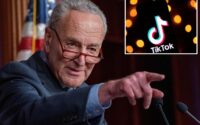Google ad chief Jerry Dischler stepping down weeks after antitrust trial testimony
Google’s longtime advertising chief Jerry Dischler will step down from his role – weeks after he drew scrutiny over bombshell admissions about the company’s ad practices at the landmark antitrust trial targeting its search empire.
Dischler, who rose to the title of vice president of advertising products at Google in 2020, will be replaced by Vidhya Srinivasan, an ad executive who joined the company in 2019. Srinivasan previously held roles at Amazon and IBM.
“After more than 15 years on Google’s ads business, Jerry Dischler decided to take on a new challenge,” Google senior vice president Prabhakar Raghavan said in a statement Wednesday. “Our ads business helps millions of businesses thrive and we’re grateful to Jerry for his many accomplishments in this area.”
“With a track record of significant innovations across privacy, measurement, AI, search ads and beyond, Vidhya is the natural successor for this role,” Raghavan said.
Dischler had raised eyebrows in September after admitting under questioning by Justice Department antitrust lawyers that Google had silently raised ad prices within its search results in order to hit revenue goals.
“We tend not to tell advertisers about pricing changes,” Dischler said in the Sept. 18 court appearance.
Dischler also confirmed the accuracy of previous sworn testimony from 2020 in which he told federal investigators that the price changes resulted in hikes from 5% to 10% for advertisers on certain search queries. Raising prices any higher would be a “dangerous thing to do” because it could lead advertisers to turn to rivals like TikTok or Meta, he added.
DOJ lawyers also referenced a May 2019 email in which Dischler expressed concern about Google missing its quarterly revenue targets and discussed efforts at “shaking the cushions” to avoid hurting its stock price.
When reached for comment, a Google spokesperson said the move was Dischler’s decision, not the company’s, and had nothing to do with his appearance at the antitrust trial.
The spokesperson declined to say whether Dischler was shifting to a new role at Google or had left the company entirely.
The spokesperson added that Srinivasan is well-positioned to lead Google’s ad business into the future, having worked most recently on Google’s monetization strategy for generative AI features that are being integrated into its search engine.
That included a leading role in Google’s recent launch of “Performance Max,” a highly touted AI tool that helps determine where ads should run across the company’s websites. Google has said the tool will boost performance on ad campaigns according to client objectives.
The Google search antitrust trial wrapped up its 10-week run earlier this month. Judge Amit Mehta is expected to issue a ruling on whether Google violated antitrust law by mid-2024.
Google controls approximately 90% of the online search market, according to figures cited at the trial. The company’s ad business more than $220 billion in 2022 alone. Through the first three quarters of 2023, Google has already surpassed that figure.
Dischler has played a key role in shaping Google’s dominant ad business, including the company’s recent emphasis on integrated artificial intelligence tools into its search engine.
Megan Gray, a prominent antitrust watchdog and CEO of GrayMatters Law & Policy, downplayed the possibility of a connection between Dischler’s testimony and his departure.
“Other witnesses were ex-Googlers. He could’ve resigned earlier if he wanted,” Gray said. “And it’s not like he did anything fire-able.”
Business Insider was the first to report on Dischler’s exit.
As Google’s new ad chief, Srinivasan will be tasked with steering the business during a period of unprecedented scrutiny over the company’s practices.
As The Post reported, some US lawmakers and policy experts have warned that the implementation of AI tools, including Google’s Bard chatbot, could further entrench the company’s alleged monopoly over online search.
Google also faces a separate federal lawsuit alleging it has built a monopoly over the digital advertising market, as well as a separate suit from newspaper giant Gannett accusing it of “a sophisticated, anticompetitive and deceptive scheme” to dominate online ads.


